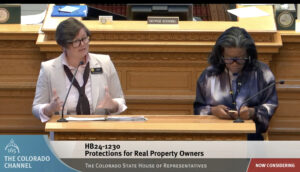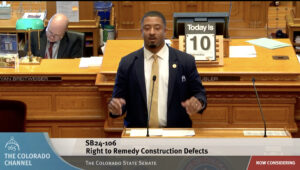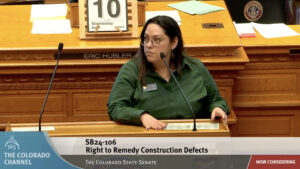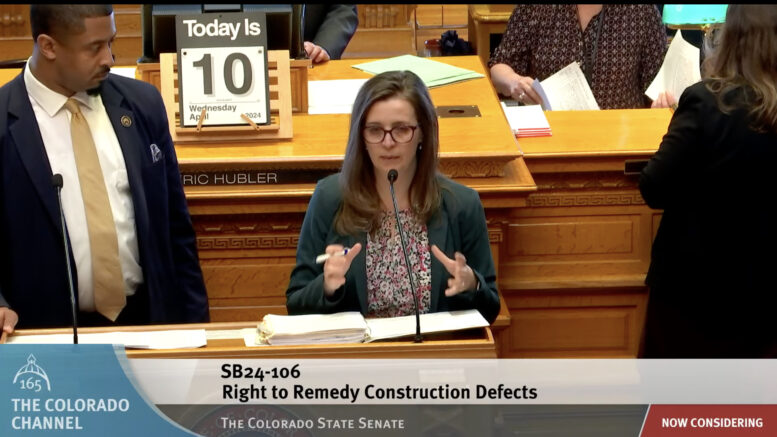Supporters of a construction-defects bill made changes Wednesday to win it significant backing in the Colorado Senate, preparing it to move it to the House and setting it on a collision course with a bill from that chamber that would roll back builders’ protections.
Democratic Sens. Rachel Zenzinger of Arvada and James Coleman of Denver amended Senate Bill 106 to cut parts of it that concerned attorneys and homeowners’ associations while preserving provisions to reduce the magnitude and frequency of defects lawsuits. While the bill got only preliminary approval on Wednesday and must get a final vote as early as Thursday, a series of procedural votes showed that it has the support of 23 of the Senate’s 35 members, including all its Republicans and 11 of the 23 Democrats.
The bill would increase from a simple majority to 60% the portion of unit owners in a condominium complex who must vote to proceed with a defects lawsuit, and it would bar legal claims from being brought over code violations that don’t endanger residents. Also, it would require that condo owners are informed of the consequences of filing such lawsuits, including the inability in most cases to refinance or sell a unit that’s under litigation.
Changes to construction-defects reform proposal
Sponsors’ biggest concession Wednesday came when they removed provisions to give condo builders a right to remedy defects claims by allowing homeowners to choose a third-party contractor to do repairs rather than dragging the matter into court. They also nixed a clause to permit lawsuits only for injury, death or “imminent” damages, inserting language instead that would allow legal actions for “verifiable danger” that could keep a building from performing its intended function of sheltering residents safely.
The changes, Zenzinger explained, were made to be able to advance the bill and restart the largely nonexistent condo market, which builders say has gone cold over the past 15 years because of the frequency of lawsuits, sometimes for technical code violations. Backers say the bill is essential to efforts to relieve Colorado’s affordable-housing crisis by boosting the stock of lower-cost residences, though supporters of other bills in a package from Gov. Jared Polis oppose SB 106 as taking away homeowners’ rights.

NAIOP Colorado Executive Director Kathie Barstnar speaks at a rally at the Capitol in March for construction-defects reform.
Kathie Barstnar, president of real-estate organization NAIOP Colorado, said builders won’t start constructing condos again unless insurers lower prices and re-enter the market — which won’t happen unless they feel lawsuits will drop substantially. The right to remedy was an optional rather than mandatory step, and the new version of the bill limits lawsuits involving code violations like the spacing between nails in a wall, she said.
“I think it’s a huge victory to get two-thirds support in the Senate, because I think that will speak volumes to the House when we get over there in the next week or so,” Barstnar said. “We had a three-legged stool. We’re now down to two. But in our opinion, we’re down to the two that have the most ability to get insurers to return to the market.”
In the House, a different construction-defects story
Despite the expected margin of passage in the Senate, however, getting SB 106 through the House will not be easy — particularly after that more heavily Democratic chamber sent a message of its own on April 4 with the passage of House Bill 1230. That measure, which seeks to boost homeowners’ rights regarding defects claims, advanced by a vote of 35-27, despite nine Democrats joining Republicans in opposition to it.
HB 1230, sponsored by Democratic Reps. Jennifer Bacon of Denver and Jennifer Parenti of Erie, would extend from 6 to 10 years the statute of repose on construction defects and delay the point at which the two-year statute of limitations begins. It also would let neighborhood associations file suits over single-family homes, add prejudgment interest for plaintiffs and make it a Consumer Protection Act violation for builders to add into contracts unenforceable clauses that attempt to limit legal action against them.

Colorado state Rep. Jennifer Parenti listens as Rep. Jennifer Bacon speaks on House Bill 1230.
Parenti cited during a March 22 House floor debate several instances in her district where homeowners have had walls fall apart, foundations crack and garages detach from homes because of construction issues, only to find it very difficult to get a legal remedy. Colorado law, particularly its shorter-than-average statute of repose, gives builders a legal advantage over homeowners that should not exist when it comes to the largest investment most people ever will make, she said.
“You’ve just got to risk it all”
Much like in the Senate, much of the debate centered on how to strike the proper balance between granting homeowners full rights and ensuring that Colorado laws aren’t so tough that builders and insurers pull out of the market. Colorado Association of Home Builders Ted Leighty warned during a March committee hearing that a flurry of defects lawsuits over single-family homes likely would generate an exodus of insurers and cause construction to become rarer and more expensive.
Rep. Ron Weinberg, R-Loveland, warned that passage of HB 1230 would stunt the legislative efforts to increase the stock of housing and leverage homebuilder competition to bring down sale and rental prices. It would “put handcuffs on the industry,” he said.
Bacon, however, pushed back and said that it would bring balance by outlawing junk contracts that attempt to stifle homeowners’ rights and give homeowners more time to see if improper work on their property causes problems like shifting of foundations.
“We continue to say to our consumers, ‘You’ve just got to risk it all,’” Bacon said. “We cannot have a statute of limitations that is unrealistic to be met.”
Legal definitions at center of construction-defects effort
During a five-hour debate in the Senate Wednesday, SB 106 opponents made similar arguments and attempted to amend the bill. Much of their focus was on trying to change the “verified danger” standard that the proposal creates for homeowners to file lawsuits.

Colorado state Sen. James Coleman speaks Wednesday in the Senate about his construction-defects reform bill.
Zenzinger and Coleman emphasized that the standard was negotiated with attorneys who have opposed the bill and said that what is a “verified danger” can be determined by factfinders such as judges or arbitrators. The bill specifically states this includes actual property damage, actual loss of use of property, bodily injury, wrongful death or the lack of capacity of a building component to perform its intended function — a wide range of outcomes that continue to permit suits for real damages, Zenzinger emphasized.
“We are trying to get at those that are performing and that haven’t resulted in any damage or any injury and are not going to result in any damage or injury,” Zenzinger said. “Right now, in statute they are all treated the same way, and we don’t believe that is a good thing. It is an expensive thing.”
Flurry of failed Senate amendments
Other senators tried to change the standard to that of an “unreasonable risk to life, health or safety” — a standard that Sen. Sonya Jaquez Lewis, D-Longmont said would lower the lawsuit bar comparatively and make it easier for homeowners to get remedies. Sen. Julie Gonzales, D-Denver, emphasized that the legal definition of “verified” requires agreement by someone with expertise, which implies that homeowners will have to pay to hire someone at a time when they already struggle with home affordability.
Other unsuccessful amendments put forward by Senate Democrats would have repealed the bill after three years, delayed implementation of the law until after a study on insurance premiums is conducted and required builders to report to the Colorado Division of Housing the number and outcome of claims filed against them. Failing to get any of those added to SB 106 left opponents saying they feel that the proposal will limit the legal options of homeowners at the expense of builders.
“I’m sorry, but for the folks who think we ought to prioritize developers over the homeowners, that’s not a calculation I would make,” Gonzales said. “And it’s not one that I think anyone in this chamber would make.”

Colorado state Sen. Julie Gonzales speaks against a construction-defects reform bill on the Senate floor Wednesday.
What’s next
HB 1230 is scheduled to be heard Tuesday afternoon by the Senate Local Government & Housing Committee — the same committee that advanced SB 106 to the full Senate on March 21. There could be an interesting dynamic at play, as Sen. Tony Exum, the Colorado Springs Democrat who sided with Republicans to get SB 106 out of that committee by a single vote, was not among the Democrats who voted to reject the series of opponents’ amendments and advance the bill Wednesday.
Barstnar said that she believes the bills are incompatible and that Wednesday’s preliminary approval of SB 106 portends a difficult road through the Senate for HB 1230. But the House’s passage last week of HB 1230 could denote the same tough pathway for SB 106.
Either way, the bills appear headed for an ideological collision, albeit in separate chambers. And while SB 106 scored a key victory in the Senate Wednesday, it remains to be seen whether either of them will make it to Polis’ desk.
